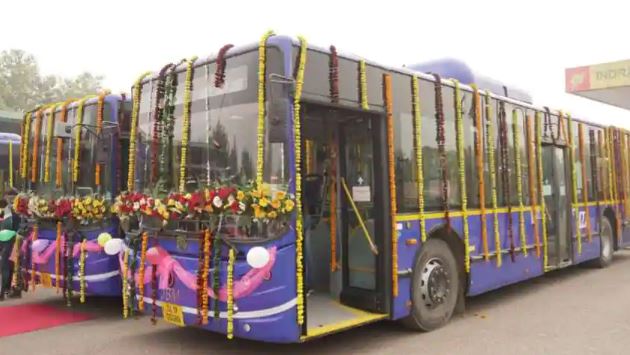
Delhi News: The Kejriwal government has taken a big step towards further strengthening the public transport system of Delhi.
On Wednesday, 80 more low-floor AC CNG buses were inducted into the government fleet. With this, for the first time in Delhi, the number of government buses has reached 7081.
The Kejriwal government has taken a big step towards further strengthening the public transport system of Delhi. On Wednesday, 80 more low-floor AC CNG buses were inducted into the government fleet.
With this, for the first time in Delhi, the number of government buses has reached 7081. Delhi Transport Minister Kailash Gehlot and Chief Secretary Vijay Kumar Dev flagged off these buses from Rajghat Bus Depot. From the newly constructed bus depot at Ghumanhera, these buses have started running on 9 routes of Delhi.
On this occasion, Delhi CM Arvind Kejriwal said that congratulations to the people of Delhi. Today 80 low-floor AC buses were added to the fleet of public buses. At the same time, while congratulating the people of Delhi, Gehlot said that under the guidance of Chief Minister Arvind Kejriwal, he is committed to facilitate the public transport service of Delhi. Transport service is being facilitated in the same sequence as promised by the Kejriwal government.
Let us tell you that the Delhi government is continuously strengthening its public transport system. In this episode, today the Delhi government has included 80 new low-floor AC CNG buses in its bus fleet. To flag off these new buses, a program was organized at Rajghat depot, where Transport Minister Kailash Gehlot flagged off all the buses on different routes of Delhi. All these buses will be operated from the newly constructed bus depot at Ghumanhera.
80 more AC CNG buses will run on 9 routes of Delhi
These buses will run on 9 routes, Kamaruddin Nagar Terminal to Sarai Kale Khan, B Block Mangolpuri to Old Delhi Railway Station, Syed Nangloi Old Delhi to Railway Station, Mehrauli Ye Mayur Vihar Phase-3,
Tikri From Border to Delhi Secretariat, West Enclave to Shivaji Stadium, Dhaula Kuan to Bhati Mines, Mangolpuri B Block to R Block New Rajinder Nagar, Mangolpuri Q Block to Safdarjung Terminal. After joining the fleet of these 80 new AC CNG buses, the number of government buses in Delhi has reached 7081.
60 electric buses will also be introduced on the roads of Delhi. On
this occasion, Transport Minister Kailash Gehlot said that the mark of 7000 in Delhi’s public transport fleet had crossed the mark of 7000, which has now increased to 7081. In the coming few days, 60 electric buses will be launched on the roads. Their registration and integration work is going on right now.
At the same time, CM Arvind Kejriwal tweeted and said, “Congratulations to the people of Delhi. Today 80 low-floor AC buses were added to the fleet of public buses. We are continuously strengthening the bus network of Delhi. Will fulfill all the promises made to the people of Delhi.
In March, 100 AC CNG buses landed on the roads of Delhi.
Earlier, in the month of March, the Kejriwal government had introduced 100 low-floor AC CNG buses on the roads of Delhi. This was the first time that the number of buses in Delhi’s public bus fleet had increased to 7001.
Now with the addition of 80 more new low-floor AC CNG buses, the total number of buses has increased to 7081. At the same time, in view of the retirement of the old fleet of buses, the Delhi government has planned to induct an additional 1000 e-buses in the DTC fleet and 240 e-buses in the cluster fleet.
The Kejriwal government is continuously adding buses to the bus fleet to strengthen its public transport. The government started the process of adding new buses in April 2016 and has been continuing since then.
The Kejriwal government has included 2026 new AC and non-AC buses in the bus fleet since 2016, in which 1386 are non-AC and 640 AC buses are included. The government had included 259 non-AC buses in 2016-17. Similarly, 96 non-AC buses were included in 2017-18, 31 in 2018-19, 927 in 2019-20, 73 in 2020-21. At the same time, 2 electric buses have been included with 135 in 2019-20, 176 in 2020-21 and 329 in 2021-22.
